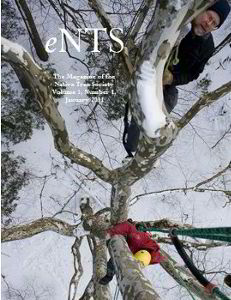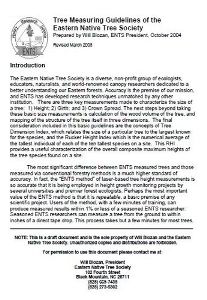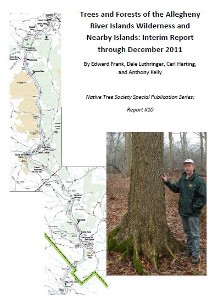|
Publications of the Native Tree Society
The Native Tree Society is the publisher several publications.
The first is a scientific journal published quarterly entitled the
Bulletin of the Eastern Native Tree Society. The second is the
eNTS Magazine published monthly primarily as a summary of materials
posted to the NTS BBS. The organization also published a series of
Special Publications on an irregular basis.
Bulletin
of the Eastern Native Tree Society
 |
The Bulletin was established in the Summer of 2006 under the
editorship of Dr. Don Bragg a Research Forester, USDA Forest Service,
Southern Research Station, P.O. Box 3516 UAM, Monticello, AR 71656.
He writes of the
journal:
Conventional wisdom holds that an organization has
really “come of age” when it can offer its membership something a little
more tangible than just a sense of belonging. In a sense, the
Bulletin of the Eastern
Native Tree Society has
been months in preparation, with many dedicated individuals working hard
to create a visual representation of the Eastern Native Tree Society.
In
reality, this journal has been years in the works, dating back to the
earliest moments of the organization as its purpose crystallized from
the efforts and interests of its founding members. So what is the vision
for the Bulletin?
I suppose if you were to ask a dozen ENTS members, you would get a dozen
different responses. Perhaps the best way to understand the Bulletin is to know the organization and its
goals. ENTS was formed not that many years ago to celebrate the forests
and trees of eastern North America through a variety of formats.
Additionally, the founders intended ENTS to serve as a repository for
highly accurate information on large tree dimensions.
ENTS is comprised of a small
but dedicated core of devoted tree measurers from many different fields—
some scientific, some not. We have writers and weather forecasters,
arborists and computer instructors, professors and students, people of
all walks of life and all levels of interest. Although centered around
some core principles, the Bulletin will reflect the diverse interests of
ENTS membership. To this end, a wide range of materials can be
submitted for consideration for publication in the Bulletin—simply
follow the instructions for authors posted in this and future issues. In
addition to more technical materials like trip reports and peer reviewed
scientific articles, the editorial board would like to encourage members
to submit poetry, pictures, stories, editorials, observations, and other
original creations that correspond to the interests of the society.
|
eNTS
Magazine
 |
The eNTS Magazine's first issue covers the period of January 2011 and
consists of a compilation of posts made to the BBS during that period.
It is edited by Edward Frank. He writes:
This magazine will be published monthly and
contain materials that are compiled from posts made to the NTS BBS
http://www.ents-bbs.org It will feature notable trip reports, site
descriptions and essays posted to the BBS by NTS members. The goal is to
have an easily distributable magazine of posts available for download
for those interested in the Native Tree Society and the work that is
being conducted by its members...
This magazine will serve as a companion to the
Bulletin and help the group reach potential new members. To submit
materials for inclusion in the next issue, post to the BBS. Members are
welcome to suggest specific articles that you might want to see included
in future issues of the magazine, or point out materials that were left
from a particular month’s compilation that should have been included.
Older articles can always be added as necessary to the magazine. The
magazine will focus on the first post on a subject and provide a link to
the discussion on the website. Where warranted later posts in a thread
may also be selected for inclusion.
|
Special Publications of the Native Tree
Society
The Native Tree Society also publishes a series of Special
Publications on an irregular basis as appropriate material
become available. The entire list is found on the
Special Publications index page
 |
Tree Measuring Guideline of the Eastern Native Tree Society -Revised
by Will Blozan
Will Blozan writes: The most significant difference
between ENTS measured trees and those measured via conventional forestry
methods is a much higher standard of accuracy. In fact, the "ENTS
method" of laser-based tree height measurements is so accurate that it
is being employed in height growth monitoring projects by several
universities and premier forest ecologists. Perhaps the most important
value of the ENTS method is that it is
repeatable,
a basic premise of any scientific project. Users of the method, with a
few minutes of training, can produce measured results within 1% or less
of a seasoned ENTS researcher. Seasoned ENTS researchers can measure a
tree from the ground to within inches of a direct tape drop. This
process takes but a few minutes for most trees.
|
 |
Trees and Forests of the Allegheny
River Island Wilderness and Nearby Islands: Interim Report
through December 2011
by Edward Frank, Dale Luthringer, Carl Harting. and Anthony Kelly
Native Tree Society Special Publication Number 10.
This report compiles the results as of December 2011 for the ongoing
project of documenting forests and trees of the islands of the Allegheny
River Island Wilderness and nearby islands in the middle Allegheny River
in north central Pennsylvania.
The islands included in this report are located in a stretch extending
from the Buckaloons Recreation Area, seven miles downstream of Warren,
Pennsylvania through Holeman Island, four miles downstream of Tionesta,
Pennsylvania.
This includes all
of the islands in the Allegheny River Islands Wilderness, a number of
forest service islands, and several private islands.
The document in three parts: Part
A,
B,
C |
Other Publications:
There are also a number of other documents that have been written by
NTS members that are available for downloads from this or other
websites:
- Multitrunk Trees, Woody Vines, and Other Forms
by Edward Frank - a classification scheme for multitrunk forms
- On Defining a
Forest Aesthetic by Edward Frank - web document
- Bookstore Listings
(needs to be updated)
© Copyright
2002-2011 Eastern Native Tree Society
|

